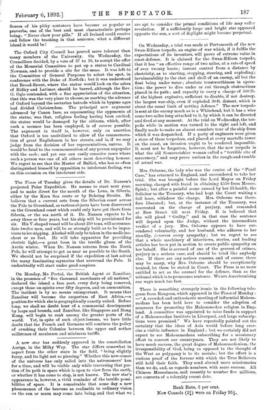The Oxford City Council has proved more tolerant than many ,
members of the University. On Wednesday, the Councillors decided, by a vote of 37 to 16, to accept the offer of the Memorial Committee to put up a statue to Cardinal Newman, and to provide a site for the same. It was left to the Committee of General Purposes to select the spot, in conference with the Duke of Norfolk; but it was understood that Broad Street, where the statue would look on the ashes of Ridleyand Latimer, should be barred, although the Rev. <1. Ogle contended, with a fine appreciation of the situation, that this was hhe very place to choose, as marking the advance of Oxford beyond the sectarian hatreds which in bygone ages had divided Christendom; The principal new argument advanced by Canon Ince, as representing the opponents of the statue, was-that, religious feeling having been excited, the statue would' be damaged by the citizens, which, after such a menace has been employed, is of course possible. The argument in itself is, however, only an assertion that Oxford is too uncivilised to allow of the commemora- tion of great Englishmen in her streets, and is, if we may judge from the decision of her representatives, untrue. It would be fatal to the commemoration of any person unpopular with the mob ; and yet one can easily conceive cases where such a person was one of • all others most deserving honour. We regret to see that the Master of Balliol, who has so often distinguished himself by, opposition to intolerant feeling, was on this occasion on the intolerant side.






































 Previous page
Previous page